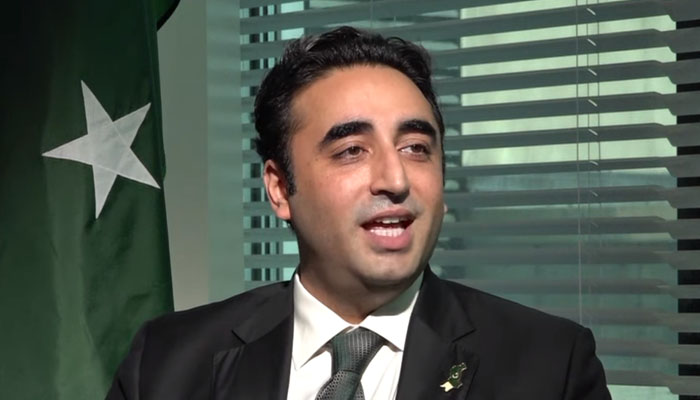Flood in Pakistan: India neither helped nor was it expected, says Bilawal
NEW YORK: Foreign Minister Bilawal Bhutto Zardari has said that India did not reach out to help Pakistan as unprecedented flooding in the country devastated infrastructure and affected over 33 million people.
In an interview with France 24 in New York, the Pakistan Peoples Party (PPP) chairman, in response to a question, said that the neighbouring country has not helped Pakistan and Pakistan has also not asked for help either.
Describing the current relations with India, the foreign minister said, “We have a long and complicated history with India… Unfortunately, India today is a changed India. It is no longer the secular India promised by its founding fathers for all its citizens.
“It is increasingly becoming a Hindu-supremacist India at the expense of its Christian and Muslim minorities and that’s not the sort of Muslim minorities within India but unfortunately in the disputed region of Illegally Occupied Jammu and Kashmir (IIOJK).”
He referred to the August 2019 move, when the Indian government revoked the special status of IIOJK, and said these recent steps and actions have left very little space for Pakistan to engage.
Bilawal added India’s “absolutely racist” and “Islamophobic” policy has caused reaction not only within Kashmir but all across India.
The PPP chairman added that the Muslim minority in India was feeling persecuted and insecure. He also said that this is an active policy of the state and this is how the government of India is treating its own Muslim citizens and that one can only imagine how they are treating the Muslims of Pakistan and IIOJK. Bilawal added that he believes the younger generation on both sides wants to see the countries living in peace.
Talking about the unprecedented flooding in Pakistan, the foreign minister said, “We are still in the state of an active disaster and the scale of climate catastrophe in Pakistan is truly apocalyptic.”
He added that the country was still in the rescue and relief phase of this tragedy. “This monster monsoon that Pakistan experienced started in mid-June and ended at the end of August… Once the rains finally stopped, it left a 100-kilometre lake in the middle of my country that could be seen from space,” he added.
Meanwhile, Minister for Foreign Affairs Bilawal Bhutto Zardari said Pakistan desires peace with India but it is evident that unless the Kashmir dispute is resolved, there would be no durable peace between the two countries.
He was delivering an opening statement as chair of the OIC Council of Foreign Ministers at the OIC Annual Coordination Meeting here. The minister said, “We are prepared to resume a sincere dialogue with India for a peaceful resolution of the Jammu and Kashmir dispute. However, the onus is on India to create an environment conducive for such a dialogue. It must rescind its unilateral and illegal measures instituted since August 5, 2019 and halt its human rights violations in IIOJK.”
Bilawal said, “Kashmir is our common cause. Jammu and Kashmir and Pakistan are bound irrevocably by geography, faith, history and culture. Kashmir is Pakistan and Pakistan is Kashmir.
“Jammu and Kashmir was forcibly occupied by India. The Security Council decided that the people of Jammu and Kashmir must be enabled to exercise their recognised right to self-determination through the UN-supervised plebiscite. India backed out from its commitment to implement the resolutions of the Security Council and respect the wishes of the people of Jammu and Kashmir.
“Since 5 August 2019, India has taken unilateral and illegal measures to undermine the internally recognised ‘disputed’ status of Jammu and Kashmir. It has increased its military deployments there to 900,000 troops and resorted to a brutal campaign of repression, including extra-judicial and custodial killing of Kashmiris, abduction of 15,000 young Kashmiri boys, many of whom were tortured, incarceration of the entire Kashmiri leadership and the burning of villages and neighborhoods as collective punishment.
This campaign of oppression is turbo-charged by the ideology of Hindutva and hatred of Muslims. The organization, Genocide Watch, has warned of the possibility of genocide in occupied Kashmir.”
He recalled that Pakistan, together with Saudi Arabia, convened the 17th Extraordinary Session of the OIC Council of Foreign Ministers in Islamabad on 19 December 2021. Meanwhile, Bilawal Bhutto Zardari attended the Closed Door Leaders Roundtable on CoP 27 on the sidelines of the 77th Session of the United Nations General Assembly (UNGA) in New York.
The foreign minister underscored that climate change is an existential threat for all nations and peoples. Its implications are becoming more pronounced, frequent and severe such as the ones manifested in the recent catastrophic floods in Pakistan.
He emphasised that even with a minimal contribution to the global greenhouse gas emissions Pakistan is facing the brunt of natural calamities in the form of heat waves, glacial outbursts, droughts, torrential rains and unprecedented monsoons causing both human and economic losses.
The Closed Door Leaders Roundtable on CoP 27 was co-hosted by the Secretary General of the United Nations and Egypt in its capacity as the President of COP 27. Earlier, Foreign Minister Bilawal Bhutto Zardari met with his Hungarian counterpart Peter Szijjert on the sidelines of 77th session of UNGA in New York.
The foreign minister stated that Pakistan highly values its relations with Hungary bilaterally as well as in the context of EU. In an interview on French TV, the foreign minister said that the International Monetary Fund (IMF) should discuss new terms after devastation caused by flash floods in Pakistan.
He said that the floods in Pakistan are a global disaster and should be understood at the global level.Bilawal said that an agreement was recently signed with the IMF for economic stability, but all the estimation and figures of the agreement have been washed away by the recent flood.
The floods have caused a loss of $30 billion to Pakistan, he added and said that the situation has changed after the flood, and the IMF should discuss new terms.“We don t want aid but justice from the international community,” he said.
-
 ASAP Rocky Recalls 'embarrassing' First Meeting With Rihanna
ASAP Rocky Recalls 'embarrassing' First Meeting With Rihanna -
 Archie, Lilibet’s Chances At Meeting King Charles Get Promising Update: Here’s Why
Archie, Lilibet’s Chances At Meeting King Charles Get Promising Update: Here’s Why -
 Claire Foy Shares Rare Views On Typecasting Amid New Gig
Claire Foy Shares Rare Views On Typecasting Amid New Gig -
 Britney Spears Raves About Madonna In New Social Media Post
Britney Spears Raves About Madonna In New Social Media Post -
 Hailey Bieber Shares Sweet Snap Of Husband And Baby
Hailey Bieber Shares Sweet Snap Of Husband And Baby -
 Therapist Killed In Office As Former Client Launches Knife Attack
Therapist Killed In Office As Former Client Launches Knife Attack -
 Gaten Matarazzo Brands 'Stranger Things' Final Scene 'nerve-racking'
Gaten Matarazzo Brands 'Stranger Things' Final Scene 'nerve-racking' -
 David Beckham Speaks Out After Son Brooklyn Beckham's Shocking Post
David Beckham Speaks Out After Son Brooklyn Beckham's Shocking Post -
 Sophie Turner Gets Candid About 'imposter Sydrome' Post 'GOT'
Sophie Turner Gets Candid About 'imposter Sydrome' Post 'GOT' -
 When Nicola Peltz's Boyfriend Anwar Hadid Found Solace In Dua Lipa's Arms
When Nicola Peltz's Boyfriend Anwar Hadid Found Solace In Dua Lipa's Arms -
 Claire Foy Reveals Rare Impact Of 'The Crown' Gig On Career
Claire Foy Reveals Rare Impact Of 'The Crown' Gig On Career -
 Megan Thee Stallion Teases New Music On The Way
Megan Thee Stallion Teases New Music On The Way -
 Blonde Kate Stuns In Photos With Prince William During Rare Joint Engagement
Blonde Kate Stuns In Photos With Prince William During Rare Joint Engagement -
 Kate Gosselin Reveals Harrowing Moment Thief Nearly Took Her Down
Kate Gosselin Reveals Harrowing Moment Thief Nearly Took Her Down -
 Billy Bob Thornton Weighs In On Contrast To 'Landman' Role
Billy Bob Thornton Weighs In On Contrast To 'Landman' Role -
 Amanda Holden May Swap Position To Different Reality Show: See Which
Amanda Holden May Swap Position To Different Reality Show: See Which




